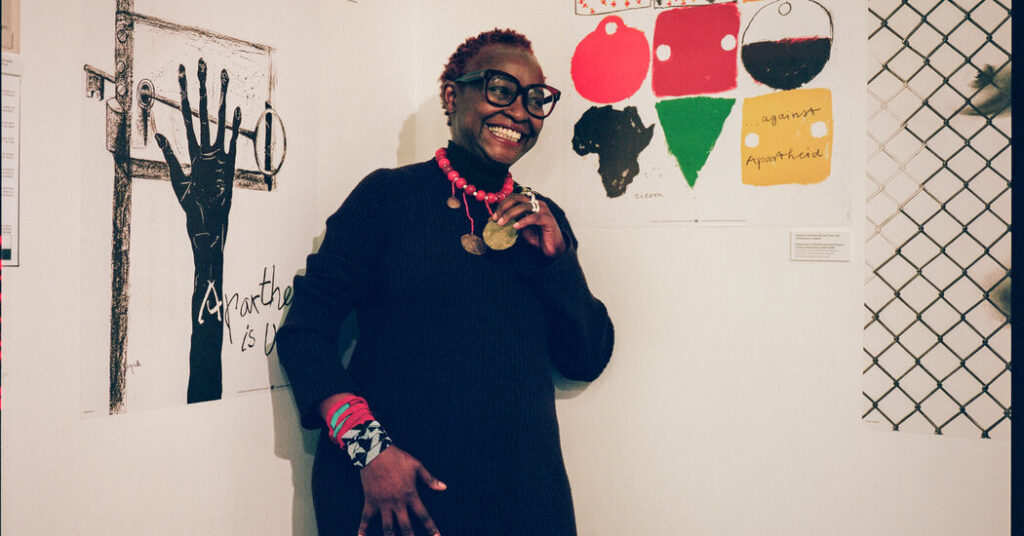Koyo Kouoh, one of the global art world’s most prominent figures, who had been slated to become the first African woman to curate the Venice Biennale, died on Saturday in Switzerland. She was 57.
Her death was confirmed by the biennale’s organizers. The announcement did not cite a cause or say where in Switzerland she had died.
The biennale said that Ms. Kouoh’s “sudden and untimely” death came just days before she was scheduled to announce the title and theme of next year’s event. The statement added that her death “leaves an immense void in the world of contemporary art.”
The Venice Biennale is arguably the art world’s most important event. Staged every two years since 1895, it always includes a large-scale group show, organized by the curator, alongside dozens of national pavilions, organized independently.
A spokeswoman for the biennale did not immediately respond to a request for comment on what Ms. Kouoh’s death would mean for next year’s exhibition, which is scheduled to run from May 9 through Nov. 22.
As the curator and executive director of Zeitz MOCAA, one of Africa’s largest contemporary art museums, Ms. Kouoh built a global reputation as a torchbearer for artists of color from Africa and elsewhere, although her interests were global in reach. “I’m an international curator,” she said last December in an interview with the The New York Times.
When Ms. Kouoh arrived at Zeitz MOCAA in 2019, the museum was struggling, run by an interim director, Azu Nwagbogu. Its founding director, Mark Coetzee, had resigned amid allegations that he harassed members of his staff.
“The museum was in crisis when Koyo came on, subsequently compounded by the pandemic” Storm Janse van Renseburg, who was then a senior curator at Zeitz MOCAA, said in a 2023 interview. “She brought it back to life.”
The artist Igshaan Adams, who held a residency position at the museum for eight months during Ms. Kouoh’s tenure, said that she had changed the way the local community felt about Zeitz MOCAA. “She made me, us, care again about the museum,” he said. It was the first time, Mr. Adams said, that he had experienced a real public engagement “with people who look like me and speak like me.”
Ms. Kouoh said frequently in interviews that she never expected to become an art world figure. She was born in Cameroon on Dec. 24, 1967, and grew up in Douala, the country’s largest city and economic capital, before moving at age 13 to Switzerland, where she eventually studied business administration and banking and worked with migrant women as a social worker.
The turning point in her career came in her mid-20s, when she became a mother. “I couldn’t imagine raising a Black boy in Europe,” Ms. Kouoh said in the 2023 interview. In 1995, she moved to Dakar, Senegal, “to explore new frontiers and spaces,” and after working as an independent curator for several years, she founded Raw Material, an artist residency program that later expanded to include an exhibition space, a library and an academy that offered a mentoring program for young art professionals.
“I thought it was amazing that she was not just a curator but an institution builder,” Oluremi C. Onabanjo, an associate curator of photography at the Museum of Modern Art, said in a 2023 interview. “A global thinker, rooted in Africa.” She added that Ms. Kouoh “enlivened and expanded a sense of possibility for a generation of African curators across the globe.”
While based in Dakar, Ms. Kouoh expanded her reputation as a forceful, visionary voice on the contemporary art scene. She worked on the curatorial teams for Documenta 12 and 13 and curated the educational and artistic program of the 1-54 Contemporary African Art Fair, the Irish Contemporary Art Biennale in 2016, and other international exhibitions.
Touria El Glaoui, the founding director of 1-54, said in an interview that Ms. Kouoh was “the most important curator of artists from the African continent,” adding, “She gave voice to so many talents.”
In the 2023 interview, Ms. Kouoh said that she had initially rejected the idea of taking on the directorship of Zeitz MOCAA. But after conversations with Black colleagues, she said, there was “a feeling that we cannot let this fail. We don’t have anything else like this on the continent.”
Throughout her career, Ms. Kouoh pushed to bring African artists to a world that had long either ignored them or typecast them. “I am part of that generation of African art professionals who have pride and knowledge about the beauty of African culture, which has often been defined by others in so many wrong ways,” she said in the same interview.
“I don’t believe we need to spend time correcting those narratives,” she added. “We need to inscribe other perspectives.”
Survivors include her partner, Philippe Mall. Complete information on survivors was not immediately available.
Ms. Kouoh was a mentor to artists and curators all over the world, “championing people and ideas that she knew to be important,” said Kate Fowle, the director of the Arts Program for the Hearthland Foundation, an organization supporting democracy and collaboration that was founded by Kate Capshaw and Steven Spielberg in 2019.
Her appointment as the curator of the 2026 Venice Biennale was welcomed by the art community. “She was remarkably deserving,” said Adrienne Edward, the senior curator and associate director of curatorial programs at the Whitney Museum of American Art in New York. She added that it was Ms. Kouoh’s “unique ability to be grounded in a place, in herself, in artists — her ethical rootedness — which profoundly and specifically contoured her exhibition making.”
Speaking to The Times after the announcement of her appointment, Ms. Kouoh said she wanted to create a show that “really speaks to our times,” adding that she was an artist-centered curator. “The artists will define where we go,” she said.


